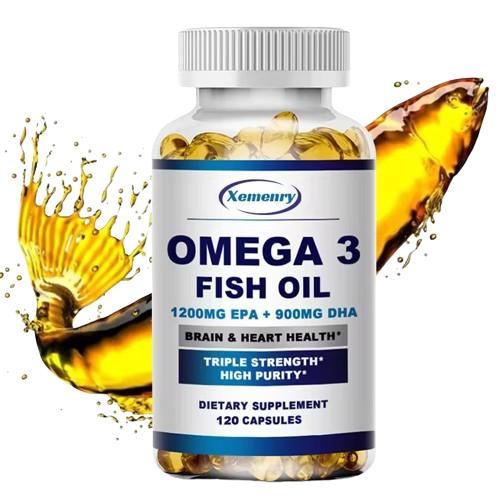
Omega-3 fatty acids are recognized as one of the most important nutrients for maintaining optimal health. Whether you’re looking to improve heart health, improve brain function, or support overall wellness, understanding what omega-3s are and how they benefit you can help you make informed dietary choices. In this article, we’ll discuss the many benefits of omega-3s, the best sources to include in your diet, and guidelines for how much you should be consuming.
What are Omega-3 Fatty Acids?
Omega-3 fatty acids are a type of polyunsaturated fat that is essential for human health. Unlike saturated fats or trans fats, omega-3s have anti-inflammatory properties and are important for numerous bodily functions. There are three main types of omega-3 fatty acids:
EPA (Eicosapentaenoic Acid):-
Primarily found in fish oil, EPA is known for its anti-inflammatory effects and cardiovascular health benefits.
DHA (docosahexaenoic acid): Also found in fish oil, DHA is crucial for brain health, vision and overall cognitive function.
ALA (Alpha-Linoleic Acid): Found in plant-based sources, ALA can be converted to EPA and DHA, although this conversion is not very efficient.
Benefits of Omega-3 Fatty Acids
- Heart health:-
Omega-3s are renowned for their cardiovascular benefits. They help lower blood pressure, reduce triglyceride levels and reduce the risk of heart disease. Regular consumption of omega-3s can help prevent plaque build-up in arteries and reduce inflammation, which contributes to overall heart health. - Brain function:-
DHA, in particular, is a major component of brain gray matter and is essential for maintaining cognitive function. Adequate levels of DHA have been linked to improved memory, focus and overall brain health. Some studies have shown that omega-3s may also play a role in reducing the risk of neurodegenerative diseases such as Alzheimer’s. - Joint health:-
The anti-inflammatory properties of omega-3s make them beneficial for joint health. They can help relieve symptoms of arthritis and other inflammatory conditions by reducing joint inflammation and stiffness. - Muscle recovery and growth:-
Omega-3s can aid muscle recovery and growth by reducing exercise-induced inflammation and supporting overall muscle repair. This makes them a valuable addition to the diet of athletes and people engaged in regular physical activity. - Mood and mental health:-
Omega-3s have been shown to have positive effects on mood and mental health. They can help reduce symptoms of depression and anxiety, making them a valuable component of a holistic approach to mental well-being.

Best food sources of omega-3 fatty acids
Including omega-3-rich foods in your diet is a great way to reap their benefits. Here are some top Sources:
Omega-3 rich fish
Mackerel: 2.0 grams of EPA + DHA per 3-ounce serving
Salmon (Farmed, Atlantic):- 1.7 g
Herring (Atlantic):- 1.3 g
Anchovy:- 1.2 gm
Salmon (wild, Atlantic):- 1.2 grams
White fish:- 1.1 gm
Tuna (Bluefin):- 1.0 g
Halibut (Greenland):- 0.8 g
Sardines (Atlantic, canned in oil):- 0.8 gm
Tuna (albacore, canned in water):- 0.7 g
Plant-based sources of ALA
Flaxseeds: One of the richest sources of ALA. Aim for about 2 tablespoons of ground flaxseed per day.
Chia seeds
walnut
Algae Oil: A vegetarian-friendly alternative to fish oil.
canola oil
Edamame
Soybean oil
How Much Omega-3 Should You Eat?
The amount of omega-3 fatty acids you should consume may depend on your health status and dietary needs.
The American Heart Association recommends:-
General population:-
At least two servings of fatty fish per week (about 6-8 ounces).
People suffering from heart disease:-
A higher intake of omega-3s may be beneficial, but it is important to consult a healthcare provider for individual advice.
For those who cannot eat fish, omega-3 supplements such as fish oil or algae oil may be beneficial. However, it is important to consult with a healthcare provider before starting any new supplement regimen.
Concerns about Mercury in Pisces:-
Some fish can contain high levels of mercury, which can be harmful if eaten in excess.
Fish with high mercury levels include:-
King mackerel
Merlin
Orange rough
the shark
Swordfish
Tilefish (Gulf of Mexico)
tuna (bigeye)
Pregnant women, young children and other sensitive groups should limit their consumption of high-mercury fish and choose safer alternatives.
For example:-
Anchovy
Herring
Mackerel (Pacific chub or Atlantic)
Salmon
Sardines
Trout (freshwater)
Tuna (light, canned)
What if you can’t eat fish?
Plant-based sources of ALA and algae-derived omega-3 supplements are excellent alternatives for those who cannot or do not like fish. These options provide the benefits of omega-3 without the need for fish.
Conclusion Omega-3:-
Omega-3 fatty acids are essential for maintaining good health, providing benefits ranging from improved cardiovascular health to improved cognitive function. By including omega-3-rich foods in your diet or considering supplementation as needed, you can support your overall wellness and achieve your health goals. Always consult a healthcare provider to tailor your omega-3 intake to your specific needs and conditions.
Share your experiences with Omega-3 or ask questions in the comments below!
How do you use omega-3 in a sentence?
What are omega-3’s and why are they important?
How do you feel after taking omega-3?
Is omega-3 good for learning?
Omega 3 changed my life Reddit
Omega-3 benefits for women
Omega 3 Reddit skin
Omega-3 benefits for men
Are omega-6 good for you
omega-3 benefits for hair
should i take omega-3 or fish oil
Omega 3 reddit ADHD





